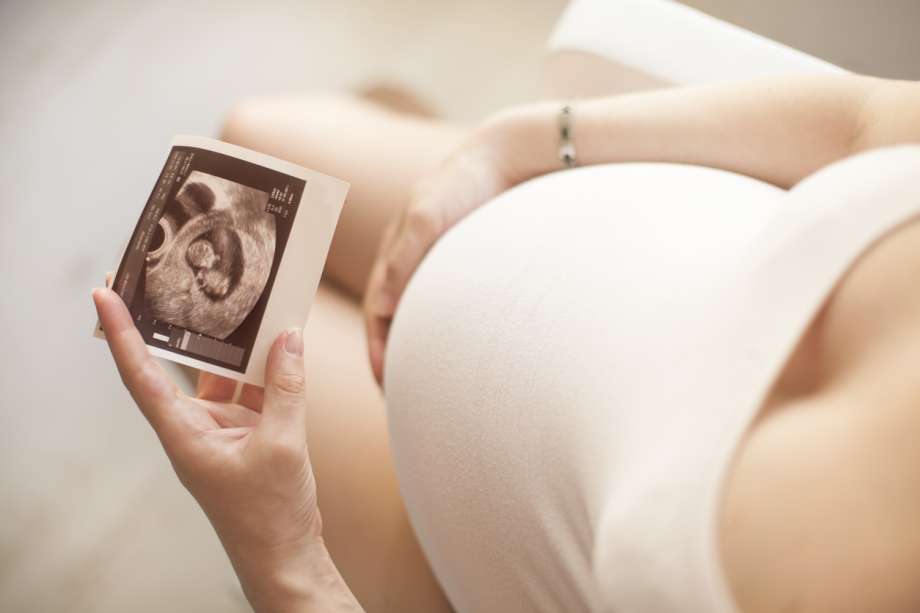Why Babies Hiccup in the Womb: Facts About Fetal Hiccups

Whether it’s your first pregnancy or your fifth, new and unfamiliar sensations may arise - including the odd sensation of fetal movements and baby hiccups!
Why do some babies hiccup in the womb? And how can you recognize fetal hiccups over other pregnancy symptoms like a kick?
Can Babies Hiccup in the Womb?
Yes, they can!
The first time you feel your baby move, you might wonder if it’s a fetal hiccup or your baby kicking. Both are totally normal and can even be a good sign. We’ll discuss the difference in a bit.
What are Fetal Hiccups?
Fetal hiccups are like anyone else’s hiccups: a contraction of the diaphragm.
In the womb, a baby breathes amniotic fluid, not air. When the baby inhales, the fluid enters the baby’s lungs, causing the baby’s diaphragm to contract. When the diaphragm contracts, it causes the baby’s body to jerk. And this is what the parent feels.
Fetal hiccups are a part of practice breathing and a completely normal part of lung maturation and fetal development.
Fetal hiccups may also occur when your baby sucks its thumb (Malachi, 2023).
Are Fetal Hiccups Normal?
Yes, they are!
In fact, before the 24th week of gestation, fetal hiccups are the most common movement of a baby’s diaphragm (Pillai, 1990). You can think of the little “hics”’ as practice breaths.
Interestingly, while a baby may hiccup periodically from the first trimester onward, a parent might not feel it until the end of the second trimester.
Not all babies will hiccup, but if yours does, don’t be alarmed!
What Do Fetal Hiccups Feel Like?
Many describe the sensation of fetal hiccups as a rhythmic jerking. It’s also been described as a jerky pulsing sensation.
The sensation may continue for as long as 20 minutes (Leiffer, 2021). Although you or I might not want to hiccup for that long, for a developing fetus, it’s totally normal.
Should you be Worried About Fetal Hiccups?

In general, no.
Fetal hiccups can be a good sign that your baby’s lungs, nervous system, and reflexes are developing well.
However, jerky movements in the third trimester may not be hiccups, but rather a sign of a couple of different problems, including problems with the umbilical cord.
When in doubt, contact your doctor, obstetrician or healthcare provider.
When do Fetal Hiccups Usually Stop?
Fetal hiccups typically lessen in frequency and intensity in late pregnancy as your due date approaches. For this reason, if they become more intense and frequent during the third trimester, it’s important to contact your healthcare practitioner.
How to tell Fetal Hiccups from Fetal Kicks
The second trimester is when most expectant parents begin to feel quickening, that is, their baby’s movements. Your baby’s body is growing and developing at a rapid rate, and you may experience many different types of movements, from jabs and flutters to kicks and rolls.
When a baby hiccups, its entire body reacts in a forceful rhythmic pattern. You might feel a rhythmic, jerking motion or a jerky pulsing. The sensation may last for up to twenty minutes.
Kicks, on the other hand, are not rhythmic. Every baby has their own pattern of kicks and movements. It’s a good idea to be aware of your baby’s pattern, so that if that pattern changes, you can discuss it with your doctor.
Some people like to do “kick counts” to get an idea of their baby’s activity patterns. Count The Kicks has a printable kick chart and other information that can help you to keep track of your baby’s movements.
When to See Your Doctor
Pediatric health professionals are there to make sure that you and your baby remain healthy and safe. If you have any concerns about your well-being or your baby’s, it’s important to contact your practitioner.
In addition, if you experience any of the following, contact your doctor immediately.
If you haven’t felt your baby move at all by the twenty-fourth week of pregnancy, it’s important to have your healthcare provider check the fetal heart rate and general health.
If your baby is moving less than usual or has stopped moving, contact your healthcare provider at once. Reduced movement can be a sign of infection or another problem.
If your baby’s pattern of movement changes, don’t wait to discuss it with your doctor. It could save your baby’s life.
Some people may use a home Doppler to check their fetal heartbeat. But experts recommend against relying on home equipment to determine your baby’s health (Markert, 2021). If your baby’s activity patterns change, it’s important to contact your doctor immediately.
It’s natural to be concerned, as some sensations during pregnancy can indicate a problem or pregnancy complication.
Fortunately, fetal hiccups are not one of them. When babies hiccup in the womb, it’s completely normal and harmless.
Myths About Baby Hiccups
Pregnant women/pregnant people may find themselves on the receiving end of well-meaning advice, myths, and cautionary tales. Don’t take it to heart. If you have worries or concerns, it’s important to speak to your healthcare provider. But fetal hiccups are nothing to be upset about.
You might hear a few specific myths regarding in-utero hiccups. Let’s bust those myths right now.
Hiccups as a Sign of Umbilical Cord Problems
Some have speculated that fetal hiccups are associated with compression of the umbilical cord, which is a potentially dangerous condition. Some believe that babies hiccup to reduce blood flow from a knotted or compressed cord.
However, according to Dr. Robyn Horsager-Boehrer, an OB/GYN, that’s unlikely (Horsager-Boehrer, 2021). If it were the case, Horsager-Boehrer says, one would expect fetal hiccups to develop in the presence of other problems caused by umbilical cord compression, such as water breaking early, or during labor and delivery. And this is not the case.
Umbilical cord compression and other umbilical cord problems can occur, especially later in pregnancy, and Increased fetal movement can be a symptom of umbilical cord problems. But in these cases, the sensation is more of random jerking and hyperactivity, rather than the rhythmic twitching of hiccups.
Hiccups as a Predictor of Stillbirth
Another myth is that baby hiccups portend stillbirths. This, too, is false.
A study published in BMC Pregnancy and Childbirth (Heazall et al, 2017) showed no difference in the rate of stillbirths between pregnant people who reported fetal hiccups and those who didn’t.
Other Myths About Pregnancy Hiccups
Some people mistakenly believe that fetal hiccups are a sign of other problems, including:
- Problems with the placenta
- Going into labor early
- Fetal seizures
Again, these are myths. Fetal hiccuping is normal. But if you have any concerns, don’t hesitate to discuss them with your healthcare provider.

